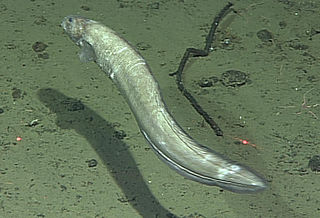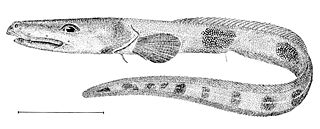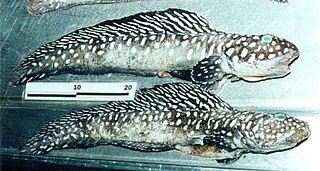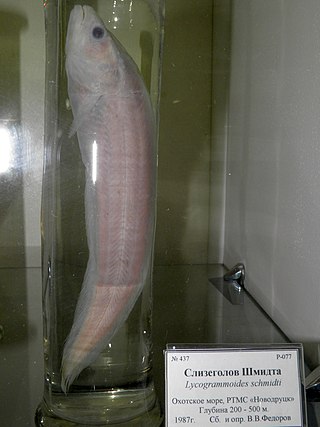The eelpouts are the ray-finned fish family Zoarcidae. As the common name suggests, they are somewhat eel-like in appearance. All of the 300 species are marine and mostly bottom-dwelling, some at great depths. Eelpouts are predominantly found in the Northern Hemisphere. The Arctic, north Pacific and north Atlantic oceans have the highest concentration of species; however, species are found around the globe.
Zoarces is a genus of marine ray-finned fishes belonging to the family Zoarcidae, the eelpouts. It is the only genus in the subfamily Zoarcinae. These eelpouts are found in the northern Atlantic and northern Pacific Oceans.
Aiakas is a genus of marine ray-finned fishes belonging to the family Zoarcidae the eelpouts. These fishes are found in the southwestern Atlantic Ocean.

Bothrocara is a genus of marine ray-finned fishes belonging to the family Zoarcidae, the eelpouts. They are found in the Pacific Ocean with one species reaching the southwestern Atlantic Ocean.

Pachycara is a genus of marine ray-finned fishes belonging to the family Zoarcidae, the eelpouts. The fishes in this genus are found in the Atlantic, Indian, Southern and Pacific Ocean.

Thermarces is a genus of marine ray-finned fish belonging to the family Zoarcidae, the eelpouts. They are associated with hydrothermal vents and cold seeps at bathypelagic depths in the East Pacific and West Atlantic Ocean.

Lycenchelys is a genus of marine ray-finned fishes belonging to the family Zoarcidae, the eelpouts. The genus has almost cosmopolitan distribution.
Lycodinae is a subfamily of marine ray-finned fish belonging to the family Zoarcidae, the eelpouts. These eelpouts are found are in all the world's oceans, with a number of species being found off southern South America.
Argentinolycus is a monospecific genus of marine ray-finned fish belonging to the family Zoarcidae, the eelpouts. Its only species is Argentinolycus elongatus which is found in coastal southern eastern South America.

Austrolycus is a genus of marine ray-finned fishes belonging to the family Zoarcidae, the eelpouts. The two species in this genus are found in the southeastern Pacific Ocean and the western South Atlantic Ocean off southern South America and the Falkland Islands.
Bothrocarina is a genus of marine ray-finned fishes belonging to the family Zoarcidae, the eelpouts. The two species in this genus are found in the Northwestern Pacific Ocean.

Iluocoetes is a monospecific genus of marine ray-finned fish belonging to the family Zoarcidae, the eelpouts. The only species in the genus is Iluocoetes fimbriatus. This species is found off southern South America, off Chile and Argentina, in the southeastern Pacific and southwestern Atlantic Oceans.
Japonolycodes is a monospecific genus of marine ray-finned fish belonging to the family Zoarcidae, the eelpouts. The only species in the genus is Japonolycodes abei. This species is found Northwestern Pacific Ocean off Japan.
Lycodapus is a genus of marine ray-finned fishes belonging to the family Zoarcidae, the eelpouts. The species in this genus are found in the Pacific and Southern Oceans.
Lycodonus is a genus of marine ray-finned fish belonging to the family Zoarcidae, the eelpouts. The species in this genus are found in the North and Southern Atlantic Ocean. These fishes are sometimes called scutepouts.

Lycogrammoides is a monospecific genus of marine ray-finned fish belonging to the family Zoarcidae, the eelpouts. Its only species is Lycogrammoides schmidti, a rare species of the Sea of Okhotsk in the northwestern Pacific Ocean.
The bearded eelpout is a species of marine ray-finned fish belonging to the family Zoarcidae, the eelpouts. This species is the only species in the monospecific genus Lyconema. It is found in the eastern Pacific Ocean.
Maynea is a monospecific genus of marine ray-finned fish belonging to the family Zoarcidae, the eelpouts. Its only species is Maynea puncta which is found in the Magellan Province of the southeastern Pacific Ocean and the southwestern Atlantic Ocean.
Lycozoarces is a monospecific genus of marine ray-finned fish belonging to the family Zoarcidae, the eelpouts, its only species being Lycozoarces regani. It is the only genus in the monogeneric subfamily Lycozoarinae. This taxon occurs in the northwestern Pacific Ocean in the Sea of Okhotsk and the Tatar Strait in the northern Sea of Japan.

Pyrolycus jaco is a species of eelpout. These organisms are typically distinguished by their eel-like morphology and, in certain species, facial features that evoke an appearance of "pouting". This species was discovered at Jacó Scar, hydrothermal seep site in the Pacific Ocean.







